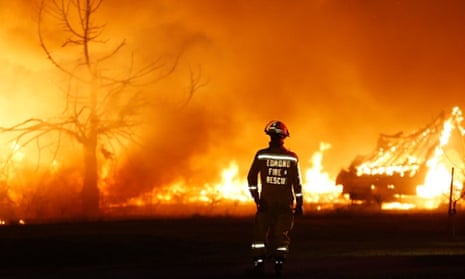The Australian public is deeply unhappy over the government’s response to the challenge of climate change, amid a revival in support for climate science and a strengthening belief that Australia is already feeling the impact of a warming planet, according to new polling.
The Climate of the Nation poll, conducted by JWS Research among 1,145 adult Australians on behalf of the Climate Institute, found that 70% accepted the mainstream scientific position that climate change is occurring.
This is a 10% increase compared to when the same question was asked in the poll in 2012, suggesting a rebounding public belief in the findings of the overwhelming majority of climate scientists. A further 89% said the effects of climate change were already beginning to bite in Australia.
But while more than half of respondents felt the federal government was the primary body which should address climate change, there was a negative rating of -18 when people were asked to rank the government’s performance.
This compares to a -1 rating from last year. These rankings are the differential between respondents’ "good" versus’ "poor" response to the government’s performance. Some 57% of those polled said the government should take climate change more seriously.
A mere 20% of those questioned said they are convinced that Tony Abbott is concerned about climate change, with 53% feeling that he isn’t. Nearly a third of people believe opposition leader Bill Shorten is worried about the problem, with around the same proportion of people thinking the reverse is true.
In a further blow to the Coalition, for the first time more people support carbon pricing than oppose it. According to the poll, 34% back the carbon pricing laws, up 6% on 2012. Public opposition to carbon pricing has collapsed by 22% since 2012, when the Coalition was repeatedly attacking the then Labor government over the policy, the poll found.
The finding comes ahead of the latest government attempt to repeal the carbon pricing mechanism on Monday. So far, the dismantling of the carbon price, as well as the scrapping of associated bodies such as the Clean Energy Finance Corporation, has been blocked by a combination of Labor and Greens senators.
According to the poll, 47% of people think that carbon pricing is preferable to no climate change policy, with just 22% supporting the government’s alternative Direct Action policy, which will offer voluntary grants to businesses keen to reduce their carbon emissions.
Meanwhile, 61% of respondents said they want Australia to be a leader in tackling climate change, up 9% from 2012, amid solid support for renewable energy initiatives.
On the Renewable Energy Target, which the government is currently reviewing amid speculation it may be wound back or scrapped, 71% of respondents said they want the target to be 20% or higher by 2020. A further 76% said there should be government incentives for renewable energy, such as wind and solar.
John Connor, chief executive of the Climate Institute, which railed against climate change ‘dinosaurs’ alongside former Liberal leader John Hewson on Sunday, said there was a strong public expectation for politicians to tackle climate change.
“There is mistrust of both Tony Abbott and Bill Shorten regarding their attitudes on climate change, but particularly Tony Abbott,” Connor said. “Yet a clear majority think the Abbott government should take climate change more seriously.
“These and many of the other findings this year reinforce that while the dinosaurs in politics and business are roaring across our landscape, the majority of Australians are shrewder about the impacts, the opportunities and the need for leadership.”

Comments (…)
Sign in or create your Guardian account to join the discussion